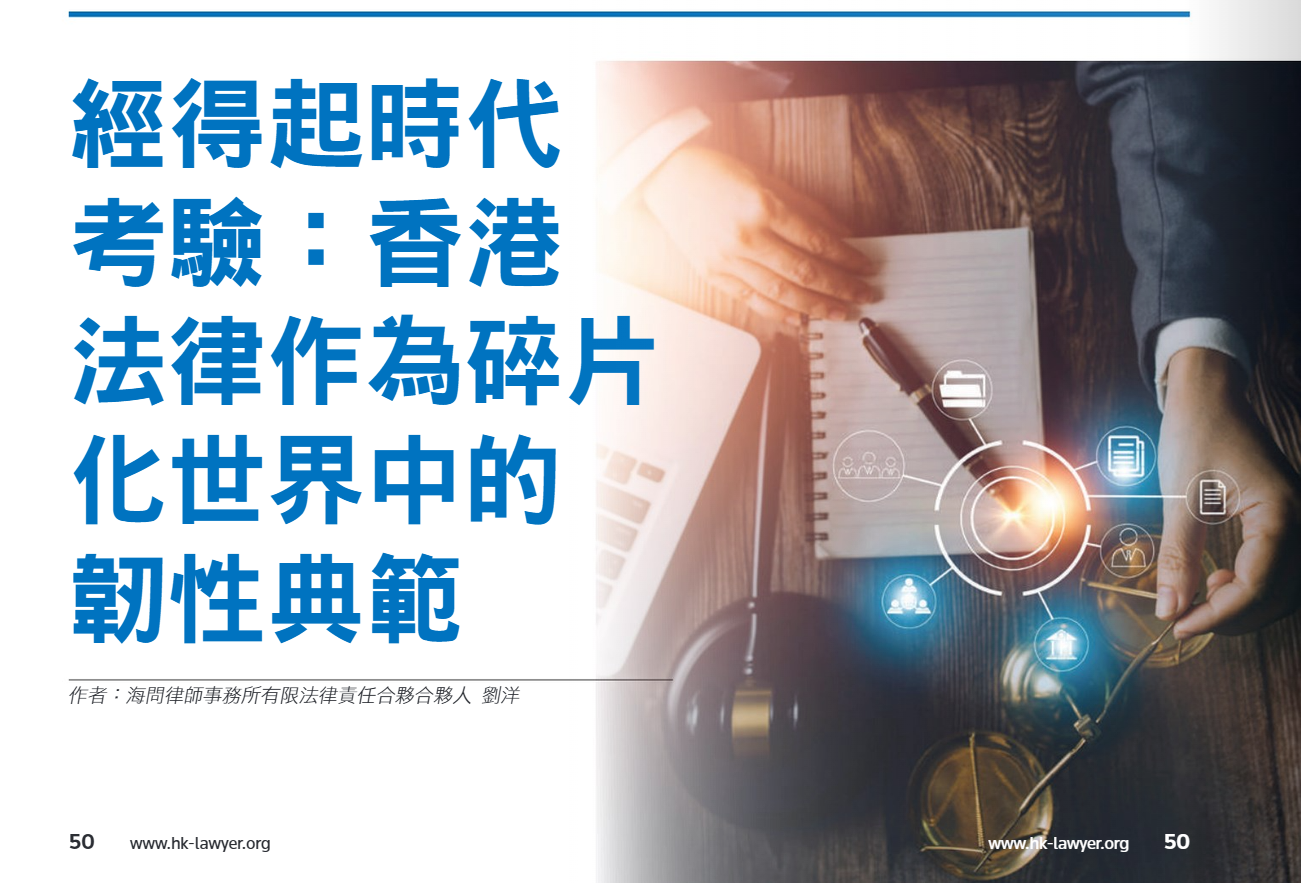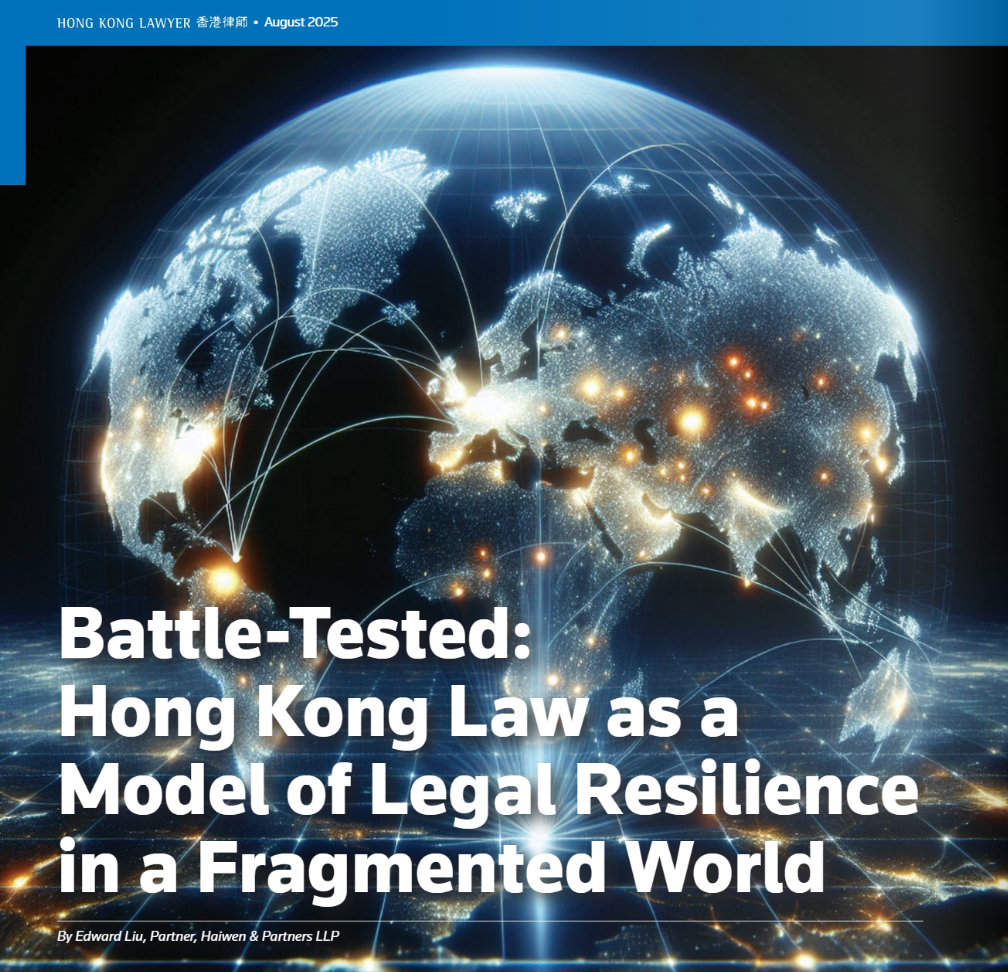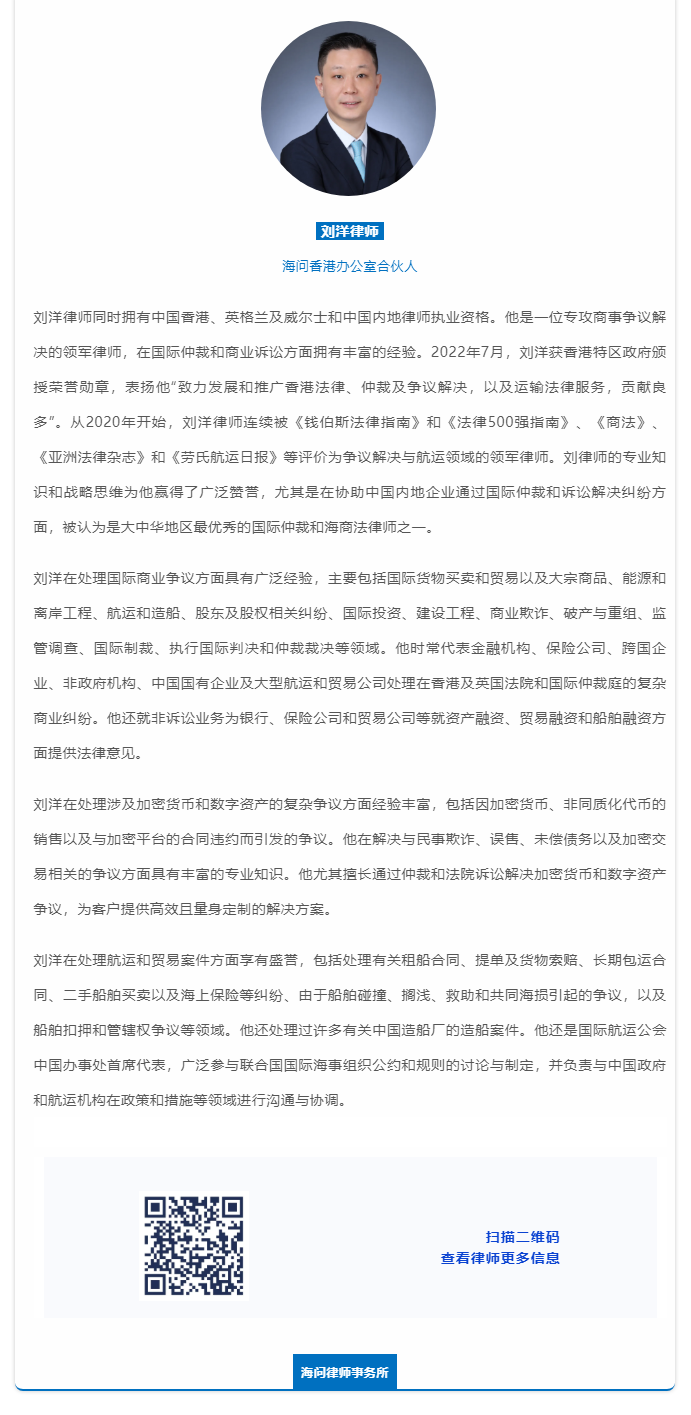


Haiwen & Partners LLP is pleased to announce that Edward Liu, Partner, has authored a feature article, “Battle-Tested: Hong Kong Law as a Model of Legal Resilience in a Fragmented World,” published in the August 2025 issue of Hong Kong Lawyer. The article examines how Hong Kong law equips businesses to navigate regulatory divergence, geopolitical volatility and complex cross border disputes by combining contractual freedom, judicial clarity and robust enforcement mechanisms.
In the piece, Mr Liu explains that in today’s fragmented trading environment, exemplified by measures such as the sweeping U.S. tariffs introduced in April 2025, contracts must function as dynamic instruments for allocating risk, preserving continuity and responding to disruption. Drawing on practical cross border experience, he outlines how Hong Kong’s common law framework supports precise drafting and strict, commercially realistic application of force majeure, material adverse change and change of law provisions, while placing appropriate evidentiary discipline on parties seeking relief.
Commenting on the publication, Edward Liu said: “Legal resilience is now a strategic imperative. Hong Kong law’s respect for party autonomy, its predictable and rigorous jurisprudence, and its unique enforcement linkages with Mainland of China enable businesses to manage volatility rather than be managed by it. From the careful construction of risk allocation clauses to world class arbitration backed by emergency relief and enforceability, Hong Kong offers a trusted platform for cross border commerce.”

The article highlights that Hong Kong courts uphold contractual bargains where thresholds are clearly met, interpreting risk allocation clauses narrowly and requiring compliance with notice, causation and mitigation obligations. It notes the high bar for common law frustration and the absence of a general hardship doctrine absent express terms, reinforcing the importance of proactive drafting and contemporaneous documentation. Mr Liu also addresses the evidentiary burden in establishing causal links between regulatory events, such as tariffs or sanctions, and performance disruption, and the relevance of Hong Kong’s statutory framework, including the Control of Exemption Clauses Ordinance and the Supply of Services (Implied Terms) Ordinance.
On dispute resolution, the article underscores Hong Kong’s arbitration infrastructure under the Arbitration Ordinance (Cap. 609), which incorporates the UNCITRAL Model Law and emphasises party autonomy and minimal court intervention. It discusses recent jurisprudence clarifying jurisdiction versus admissibility challenges, the availability and court enforceability of emergency and interim measures, and Hong Kong’s unparalleled enforcement linkages with Mainland of China, including mutual enforcement of arbitral awards and access to interim relief in support of Hong Kong seated arbitrations. In litigation, Hong Kong’s trusted judiciary and reciprocal arrangements for recognition and enforcement of civil and commercial judgments with the Mainland further enhance cross border enforceability.
For companies operating across supply chains and markets subject to rapid policy change, Mr Liu’s analysis sets out practical takeaways: allocate risk with precision at the front end; maintain the evidentiary record needed to support relief; and choose governing law and forums that deliver speed, certainty and enforceability across borders. Hong Kong law, he concludes, remains a model of legal resilience capable of supporting long term commercial success in a fragmented world.
You can read the online version of the article by following the link. To request a copy of the full published article, please contact Mr. Edward Liu via edwardliu@haiwen-law.com.


Haiwen & Partners LLP is pleased to announce that Edward Liu, Partner, has authored a feature article, “Battle-Tested: Hong Kong Law as a Model of Legal Resilience in a Fragmented World,” published in the August 2025 issue of Hong Kong Lawyer. The article examines how Hong Kong law equips businesses to navigate regulatory divergence, geopolitical volatility and complex cross border disputes by combining contractual freedom, judicial clarity and robust enforcement mechanisms.
In the piece, Mr Liu explains that in today’s fragmented trading environment, exemplified by measures such as the sweeping U.S. tariffs introduced in April 2025, contracts must function as dynamic instruments for allocating risk, preserving continuity and responding to disruption. Drawing on practical cross border experience, he outlines how Hong Kong’s common law framework supports precise drafting and strict, commercially realistic application of force majeure, material adverse change and change of law provisions, while placing appropriate evidentiary discipline on parties seeking relief.
Commenting on the publication, Edward Liu said: “Legal resilience is now a strategic imperative. Hong Kong law’s respect for party autonomy, its predictable and rigorous jurisprudence, and its unique enforcement linkages with Mainland of China enable businesses to manage volatility rather than be managed by it. From the careful construction of risk allocation clauses to world class arbitration backed by emergency relief and enforceability, Hong Kong offers a trusted platform for cross border commerce.”

The article highlights that Hong Kong courts uphold contractual bargains where thresholds are clearly met, interpreting risk allocation clauses narrowly and requiring compliance with notice, causation and mitigation obligations. It notes the high bar for common law frustration and the absence of a general hardship doctrine absent express terms, reinforcing the importance of proactive drafting and contemporaneous documentation. Mr Liu also addresses the evidentiary burden in establishing causal links between regulatory events, such as tariffs or sanctions, and performance disruption, and the relevance of Hong Kong’s statutory framework, including the Control of Exemption Clauses Ordinance and the Supply of Services (Implied Terms) Ordinance.
On dispute resolution, the article underscores Hong Kong’s arbitration infrastructure under the Arbitration Ordinance (Cap. 609), which incorporates the UNCITRAL Model Law and emphasises party autonomy and minimal court intervention. It discusses recent jurisprudence clarifying jurisdiction versus admissibility challenges, the availability and court enforceability of emergency and interim measures, and Hong Kong’s unparalleled enforcement linkages with Mainland of China, including mutual enforcement of arbitral awards and access to interim relief in support of Hong Kong seated arbitrations. In litigation, Hong Kong’s trusted judiciary and reciprocal arrangements for recognition and enforcement of civil and commercial judgments with the Mainland further enhance cross border enforceability.
For companies operating across supply chains and markets subject to rapid policy change, Mr Liu’s analysis sets out practical takeaways: allocate risk with precision at the front end; maintain the evidentiary record needed to support relief; and choose governing law and forums that deliver speed, certainty and enforceability across borders. Hong Kong law, he concludes, remains a model of legal resilience capable of supporting long term commercial success in a fragmented world.
You can read the online version of the article by following the link. To request a copy of the full published article, please contact Mr. Edward Liu via edwardliu@haiwen-law.com.

Beijing ICP No. 05019364-1 Beijing Public Network Security 110105011258